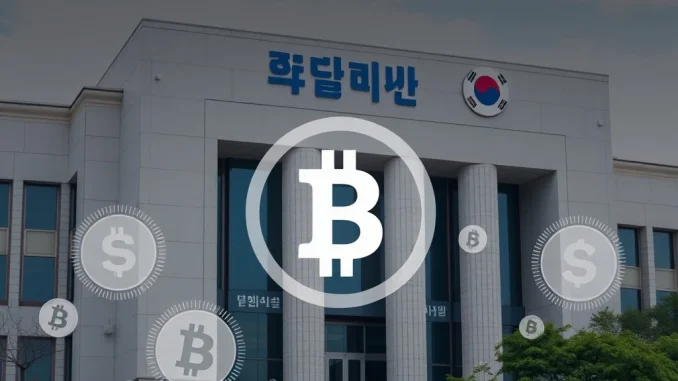
The world of traditional finance continues its cautious but steady convergence with the innovative realm of cryptocurrencies, and a recent development in South Korea highlights this trend. News from the region indicates significant steps being taken by a major financial player towards exploring digital currency, specifically focusing on a South Korea stablecoin landscape. This move could signal interesting times ahead for the nation’s financial technology sector.
What is BNK Financial Group Doing with Stablecoins?
BNK Financial Group, a prominent financial holding company based in South Korea, made an announcement on July 7 that has captured attention. Their affiliates – BNK Financial Holdings, Busan Bank, and Kyongnam Bank – are actively pursuing Trademark filing applications related to Korean won-based stablecoins. This isn’t just a single application; the numbers suggest a more comprehensive strategy:
- BNK Financial Holdings has submitted 11 trademark filings.
- Busan Bank has filed 10 trademark applications.
- Kyongnam Bank has added 4 filings to the total.
These filings are crucial steps in securing the rights to names, logos, and potentially related services for future stablecoin projects. It demonstrates a clear intention to explore and potentially launch digital currency initiatives tied to the Korean won.
Understanding the Korean Won Stablecoin Concept
So, what exactly is a Korean won stablecoin? At its core, it’s a type of cryptocurrency designed to maintain a stable value relative to the South Korean won. Unlike volatile cryptocurrencies like Bitcoin or Ethereum, a stablecoin aims for price stability, often by being backed by reserves of the pegged asset – in this case, Korean won or equivalent safe assets like government bonds.
The appeal for financial institutions like those under the BNK Financial Group umbrella lies in leveraging blockchain technology’s benefits (like faster settlement, lower transaction costs, and programmability) while mitigating the price risk associated with traditional cryptocurrencies. A won-based stablecoin could potentially be used for faster interbank settlements, cross-border payments, or even future digital payment services for customers.
The Trend Towards Bank-Backed Stablecoins
BNK’s actions are part of a growing global trend where traditional financial institutions are exploring digital currencies, often in the form of private stablecoins or in conjunction with central bank digital currency (CBDC) research. The concept of a Bank-backed stablecoin brings the potential for greater regulatory compliance and integration with existing financial infrastructure compared to many decentralized stablecoins.
Adding further weight to their commitment, Busan Bank and Kyongnam Bank have also joined the Open Blockchain & Decentralized Identifier Association (OBDIA). This organization is specifically focused on preparing for the issuance of stablecoins supported by banks. Membership in such a group suggests collaboration and a shared effort among financial players to navigate the technical and regulatory challenges involved in launching bank-grade digital assets.
Implications for the South Korea Stablecoin Market
The move by a major regional player like BNK Financial Group has several potential implications for the broader South Korea stablecoin market and its financial ecosystem:
- Increased Legitimacy: Involvement from established banks can lend credibility to the stablecoin concept in the eyes of the public and regulators.
- Potential for Adoption: If successfully launched, bank-issued stablecoins could see faster adoption due to existing customer bases and trust in the institutions.
- Regulatory Clarity: Bank involvement often necessitates closer collaboration with regulators, potentially paving the way for clearer guidelines for digital assets.
- Competition: This could spur other Korean banks and financial firms to accelerate their own digital currency initiatives.
While the Trademark filing is just one step, it’s a significant indicator of BNK’s strategic direction. Challenges remain, including regulatory hurdles, ensuring robust technology, and achieving widespread adoption, but the intent is clear.
Conclusion: A Glimpse into South Korea’s Digital Future
The recent trademark filings by BNK Financial Group affiliates mark a notable step in South Korea’s exploration of digital currencies. By preparing the groundwork for Korean won stablecoin development, entities under the BNK Financial Group are signaling their intent to participate in the evolving landscape of digital finance. The collaboration through OBDIA further underscores a collective effort within the banking sector towards realizing the potential of Bank-backed stablecoin solutions. As these initiatives progress, they could play a vital role in shaping the future of the South Korea stablecoin market and integrating blockchain technology more deeply into the nation’s financial infrastructure. Keep an eye on South Korea; its banks are clearly looking towards a digital future.



